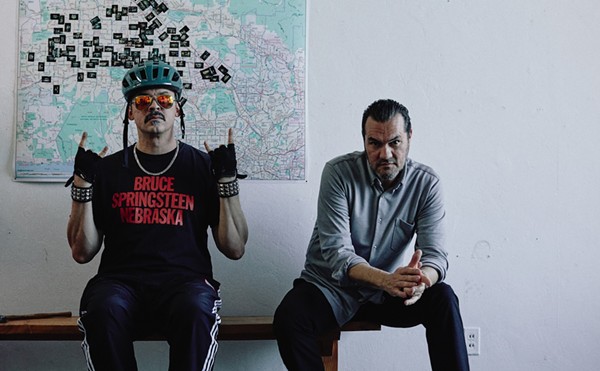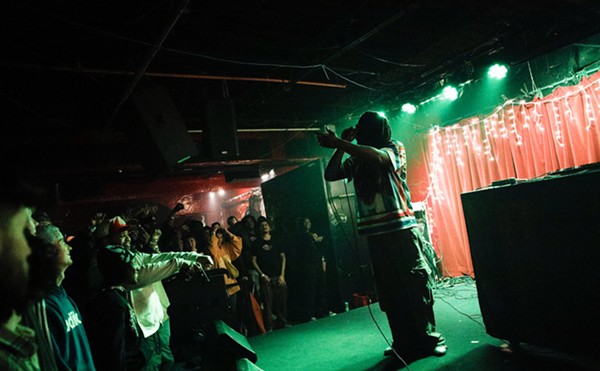Throughout the genre's tumultuous, troubled history, iconoclastic crews have risen above the muck -- A Tribe Called Quest, with its relentless positivity and jazzy undertones; De La Soul, with wry lyricism; and the Roots, with adept live instrumentation. All three have had both critical and commercial success. With only two records and a relatively brief (though strikingly impressive) touring regimen under its belt, the three-man collective called the Black Eyed Peas might not qualify to join the ranks just yet.
But they've got all the right elements -- at least on paper. Their sophomore release, Bridging the Gap, combines soulful Latin/jazz guitar grooves with Quest-like beats and unstoppable feel-good party vibes. Cameos flare up in every direction -- trip-hop chanteuse Esthero appears on the summery "Weekends," De La Soul on the playfully self-aggrandizing club jam "Cali to New York," Macy Gray on the rap-radio valentine "Request + Line," and, most effectively, Wyclef Jean on the unironically affectionate ballad "Rap Song." And given that the Peas have played on package tours such as Smoking Grooves and the Warped Tours, and have opened several dates for No Doubt, it's possible they're on the verge of becoming a troupe of upbeat, forward-thinking crossover superstars. In any event, the Peas are determined to avoid what they view as hip-hop's standard posturing channels -- "Every rapper's talkin' 'bout killin' somebody/ but they ain't hip-hop to me," goes a line on "BEP Empire."
Which raises the question, what does hip-hop mean to these guys?
"Hip-hop to me is a culture which encompasses different elements, from MC to DJ to b-boyin' to graffiti," begins rapper Taboo, a member of the Peas along with rappers Will.I.Am and Apl.de.Ap. "Basically, we encompass all those forms to conserve the heritage. Nowadays, people think of hip-hop as a moneymaker. Nowadays, people say, 'I can make money rapping,' but they neglect the culture. To us, it's the preservation of a culture."
How drastic a preservation is necessary? Is hip-hop doomed?
"It's not on the decline, 'cause rap music is probably the highest-selling form of music right now," Taboo explains. "Some people are organic, and they express the culture and understand. But a lot of these cats are doing it for the money. It's sad, because corporations are now taking over and saying, 'Fuck it, we're gonna use hip-hop jingles in our commercials.' It's kinda being raped, taken away from being organic, being rebellion-type music. It's sorta like punk rock -- it stands for independent rebellion."
Admittedly, in and of itself that doesn't constitute an innovative young hip-hop statement: The lower echelons and underground ranks of the genre are practically bursting with self-proclaimed iconoclasts hell-bent on saving rap from its diamond-studded self. What sets the Peas apart is their unabashed sincerity. Take the Wyclef collaboration "Rap Song" as the prime example. Backed by Wyclef's fluid guitar and synthesized orchestration, the track essentially equates falling in love with hearing a killer hip-hop track for the first time. "And if she was a rap song/she'd be 'Bonita Applebaum,'" goes one prominent line, referencing A Tribe Called Quest's similarly enamored hip-hop smash.
Taboo points to several songs that inspire the same reaction: Slick Rick's "Mona Lisa" and De la Soul's "Saturdays," for starters.
"Native tongues. Slick Rick. Big Daddy Kane. That era of hip-hop is where we live," he explains. "What we are."
Thus, comparisons to acts such as A Tribe Called Quest, the Roots, Jurassic 5, and Dilated Peoples are inevitable for the Black Eyed Peas, but Taboo proudly takes them on.
"Those are great comparisons, because those are groups that we look up to," he explains. "The message is the same: Feel good, be positive. Reality. That's what the message is. Organic reality."
But with their incubation period nearly over, the Black Eyed Peas intend Bridging the Gap to be a path to a singular, incomparable identity. Two prominent elements work in their favor here: a sharp ear for intelligent, infectious party jams (as evidenced on "Weekends" and "Joints and Jams," the latter appearing on both the Bulworth soundtrack and their debut record, Behind the Front) and an extremely energetic live show.
Taboo runs down the Peas game plan: live instrumentation, high energy and animation, fluid movement, a soulful backup vocalist in Kim Hill (who shows up on Bridging the Gap's "Hot"), and, most important, badass dance moves.
"We pride ourselves in bein' b-boys and having that knack and bein' able to show that we do bust some shit on the dance floor," Taboo says.
Sounds elaborate, yes, and when they're playing for the snot-nosed punks on the Warped Tour or the love-struck millions populating Gwen Stefani's fan club, a pure hip-hop crew needs all the spectacle it can find. But Taboo reiterates his belief in the common ideological bond between punk, hip-hop, and rock: He's already dreaming up new ideas for future Peas collaborations and mentions obvious greats such as Stevie Wonder, Busta Rhymes, and Prince. But he wants the aggro kids, too, so the folks in Sevendust, Rage Against the Machine, and the Red Hot Chili Peppers should expect a phone call shortly.
"I would even like to do some shit with Blink 182," Taboo says, conjuring up lurid images of punked-up hip-hop beats laced with bratty choruses, penis enlargement jokes, and gleeful midgets bouncing on trampolines in the background. A Tribe Called Quest never thought of that.













